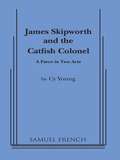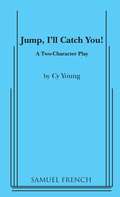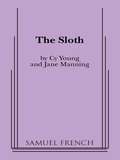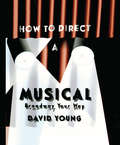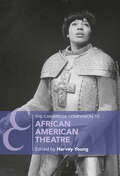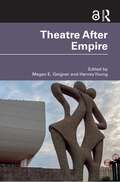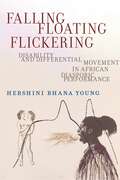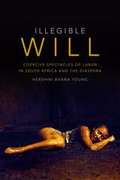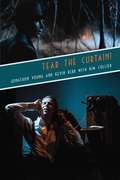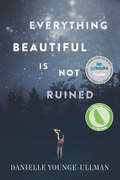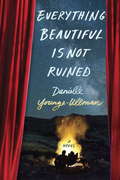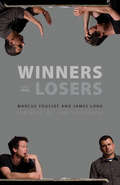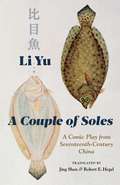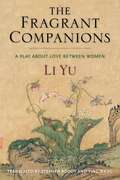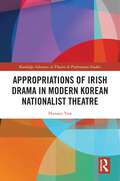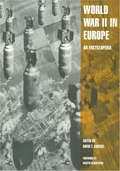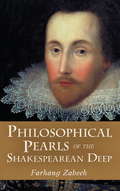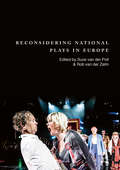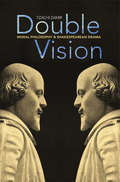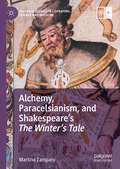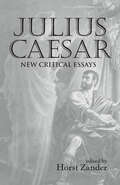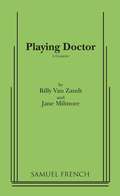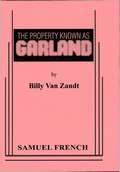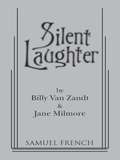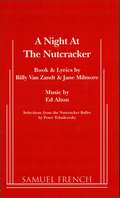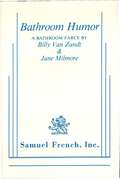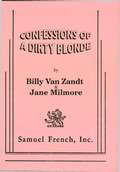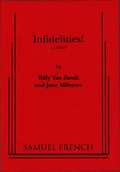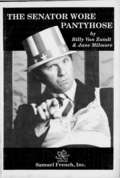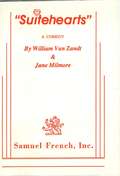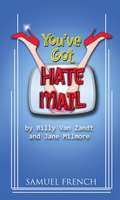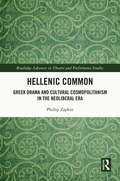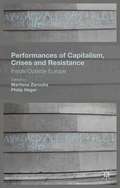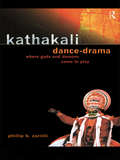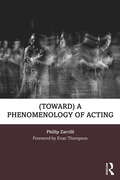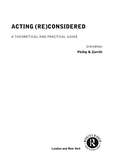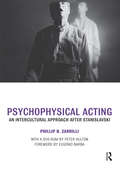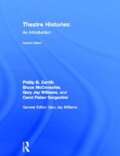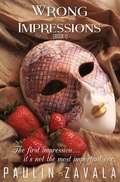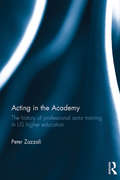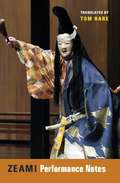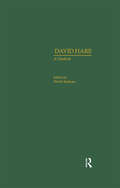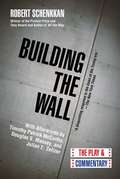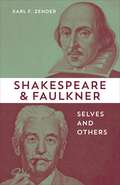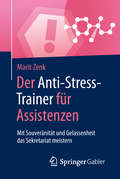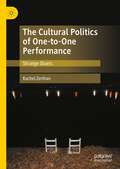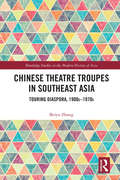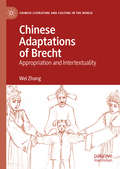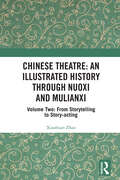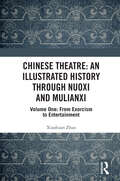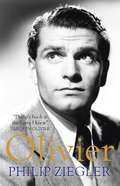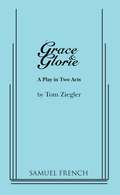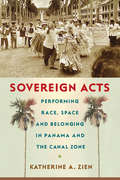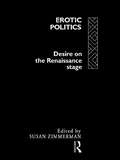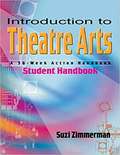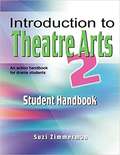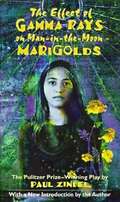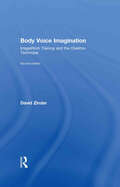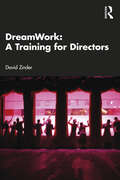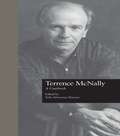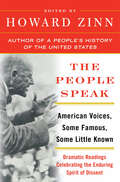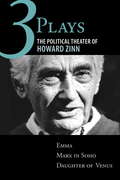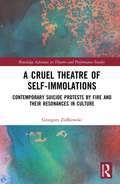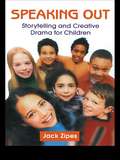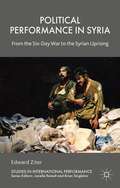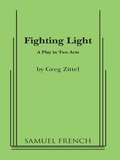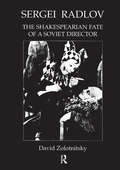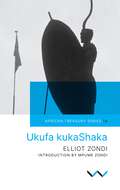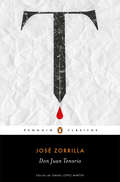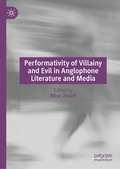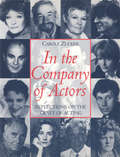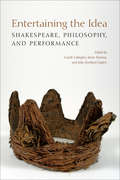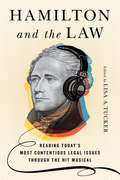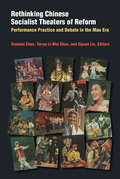- Table View
- List View
James Skipworth and the Catfish Colonel
by Cy YoungComedy / Characters: 2 male, 1 female / Interior Set / A playwright has vowed to shoot himself unless someone agrees to option his play immediately. He appears at the office of producer Helen Osborne, an attractive and highly theatrical woman who is the reigning queen on a long running soap opera. Anxious to be off to an important meeting at Sardi's, the producer doesn't take the increasingly anxious writer seriously until he nails her door shut. Helen uses all of her feminine wiles to escape as the action escalates into a zany free for all in which writer ties producer to a chair and, with the help of an actor friend in the hall outside, reads the play to her with side splitting results. The producer finally turns the tables on the hapless writer as the action explodes into a fast paced farce uniting all three in an hilarious and madcap finale.
Jump, I'll Catch You!
by Cy YoungThis wacky comedy is about two people who meet on a bus in Ypsilanti, Michigan, and discover they've both had out of body experiences. Bennie survived the car crash that killed his family; Merriam attempted suicide. As their relationship develops, Merriam's neurotic tendencies surface and Bennie's unflappable cheerfulness drives her bananas. She realizes that he is not over his tragedy and she leaves. They meet a month later on the bus. When it arrives at Bennie's stop, the cemetery, he decides to stay on the bus with Merriam.
The Sloth
by Cy YoungComedy \ 3 m., 3 f. to play var. roles. \ Ext. \ Nadine Schitzle of Tarzana, California, has a problem: there's a sloth in the eucalyptus tree in her back yard and she's convinced it's her husband, Herman. Her neighbor calls Eye Witness News anchor woman Sally Sweet, who shows up with her crew, and suddenly the story is hot news. The animal shelter representative informs Nadine that an animal that big can't be kept within the city limits and a psychiatrist from social services arrives to determine her competency. Called before a judge, Nadine explains with unquestionable logic why she feels Herman has turned into a sloth and the judge, who says Nadine reminds him of his mother, rules for competency. Back home, Nadine celebrates with her minister and a friend, who also believes Herman is the sloth, and berates her neighbors for trying to have her committed so they could get her property. She gives Herman and all his belongings except the Honda to the San Diego Zoo.
How to Direct a Musical
by David YoungHow to Direct a Musical is a lively and practical guide to the seemingly overwhelming task of directing a musical. David Young brings to this handbook his extensive experience as a director of over 100 productions and more than 250 workshops in the US, China, Senegal and Brazil. Young takes a pragmatic, do-it-yourself approach, guiding the reader from planning to casting, rehearsal to opening night. Topics covered include script analysis, collaboration with designers, musical directors, choreographers and crew, eliminating lengthy pauses between scenes, dress rehearsals and curtain calls.
The Cambridge Companion to African American Theatre (Cambridge Companions to Theatre and Performance)
by Harvey YoungThis new edition provides an expanded, comprehensive history of African American theatre, from the early nineteenth century to the present day. Including discussions of slave rebellions on the national stage, African Americans on Broadway, the Harlem Renaissance, African American women dramatists, and the New Negro and Black Arts movements, the Companion also features fresh chapters on significant contemporary developments, such as the influence of the Black Lives Matter movement, the mainstream successes of Black Queer Drama and the evolution of African American Dance Theatre. Leading scholars spotlight the producers, directors, playwrights, and actors who have fashioned a more accurate appearance of Black life on stage, revealing the impact of African American theatre both within the United States and around the world. Addressing recent theatre productions in the context of political and cultural change, it invites readers to reflect on where African American theatre is heading in the twenty-first century.
The Cambridge Companion to African American Theatre
by Harvey YoungThis Companion provides a comprehensive overview of African American theatre, from the early nineteenth century to the present day. Along the way, it chronicles the evolution of African American theatre and its engagement with the wider community, including discussions of slave rebellions on the national stage, African Americans on Broadway, the Harlem Renaissance, African American women dramatists, and the 'New Negro' and 'Black Arts' movements. Leading scholars spotlight the producers, directors, playwrights and actors whose efforts helped to fashion a more accurate appearance of black life on stage, and reveal the impact of African American theatre both within the United States and further afield. Chapters also address recent theatre productions in the context of political and cultural change and ask where African American theatre is heading in the twenty-first century.
Theatre After Empire
by Harvey YoungEmphasizing the resilience of theatre arts in the midst of significant political change, Theatre After Empire spotlights the emergence of new performance styles in the wake of collapsed political systems.Centering on theatrical works from the late nineteenth century to the present, twelve original essays written by prominent theatre scholars showcase the development of new work after social revolutions, independence campaigns, the overthrow of monarchies, and world wars. Global in scope, this book features performances occurring across Africa, the Americas, Asia, Europe, and the Middle East. The essays attend to a range of live events—theatre, dance, and performance art—that stage subaltern experiences and reveal societies in the midst of cultural, political, and geographic transition.This collection is an engaging resource for students and scholars of theatre and performance; world history; and those interested in postcolonialism, multiculturalism, and transnationalism.The Introduction ("Framing Latine Theatre and Performance") of this book is freely available as a downloadable Open Access PDF at http://www.taylorfrancis.com under a Creative Commons [Attribution-Non Commercial-No Derivatives (CC-BY-NC-ND)] 4.0 license.
Falling, Floating, Flickering: Disability and Differential Movement in African Diasporic Performance (Crip #7)
by Hershini Bhana YoungInsists on the importance of embodiment and movement to the creation of Black socialityLinking African diasporic performance, disability studies, and movement studies, Falling, Floating, Flickering approaches disability transnationally by centering Black, African, and diasporic experiences. By eschewing capital’s weighted calculus of which bodies hold value, this book centers alternate morphologies and movement practices that have previously been dismissed as abnormal or unrecognizable. To move beyond binaries of ability, Hershini Bhana Young traverses multiple geohistories and cultural forms stretching from the United States and the Mediterranean to Sierra Leone, Nigeria, and South Africa, as well as independent and experimental film, novels, sculptures, images, dance, performances, and anecdotes. In doing so, she argues for the importance of differential embodiment and movement to the creation and survival of Black sociality, and refutes stereotypic notions of Africa as less progressive than the West in recognizing the rights of disabled people. Ultimately, this book foregrounds the engagement of diasporic Africans, who are still reeling from the violence of colonialism, slavery, poverty, and war, as they gesture toward a liberatory Black sociality by falling, floating, and flickering.
Illegible Will: Coercive Spectacles of Labor in South Africa and the Diaspora
by Hershini Bhana YoungIn Illegible Will Hershini Bhana Young engages with the archive of South African and black diasporic performance to examine the absence of black women's will from that archive. Young argues for that will's illegibility, given the paucity of materials outlining the agency of black historical subjects. Drawing on court documents, novels, photographs, historical records, websites, and descriptions of music and dance, Young shows how black will can be conjured through critical imaginings done in concert with historical research. She critically imagines the will of familiar subjects such as Sarah Baartman and that of obscure figures such as the eighteenth-century slave Tryntjie of Madagascar, who was executed in 1713 for attempting to poison her mistress. She also investigates the presence of will in contemporary expressive culture, such as the Miss Landmine Angola beauty pageant, placing it in the long genealogy of the freak show. In these capacious case studies Young situates South African performance within African diasporic circuits of meaning throughout Africa, North America, and South Asia, demonstrating how performative engagement with archival absence can locate that which was never recorded.
Tear the Curtain!
by Jonathon Young Kim Collier Kevin KerrIn this psychological thriller set in a fictionalized 1930s Vancouver, Alex Braithwaite, a troubled but passionate theatre critic, believes he has found the legendary Stanley Lee, director of the infamous avant-garde theatre "The Empty Space." Alex becomes convinced that this man's radically subversive ideas are what the artistic community of the city needs to shatter audience complacency. In his pursuit of the truth behind Stanley Lee's mysterious disappearance and his artistic ideas, Alex becomes caught between the warring factions of two prominent mob families - one controlling the city's playhouses, the other its cinemas, but both ensnared by the Empty Space Society. At the dawn of the Talkies, can Alex tear through the artifice of these art forms in time to save the city's art community from ripping itself apart?The play's collaborators found inspiration within the walls of Vancouver's Stanley Theatre, a space that has a dual history as a cinema and vaudeville house. Fittingly, this gritty film-noir production became an exploration of the two kinds of art and how they affect the audience. Tear the Curtain! explores global issues that consider what we want from art: to be shocked and surprised or for order to be restored.Cast of 2 women and 8 men.
The Philosophy of Tragedy
by Julian YoungThis book is a full survey of the philosophy of tragedy from antiquity to the present. From Aristotle to Žižek the focal question has been: why, in spite of its distressing content, do we value tragic drama? What is the nature of the 'tragic effect'? Some philosophers point to a certain kind of pleasure that results from tragedy. Others, while not excluding pleasure, emphasize the knowledge we gain from tragedy – of psychology, ethics, freedom or immortality. Through a critical engagement with these and other philosophers, the book concludes by suggesting an answer to the question of what it is that constitutes tragedy 'in its highest vocation'. This book will be of equal interest to students of philosophy and of literature.
Everything Beautiful Is Not Ruined
by Danielle Younge-UllmanThen Ingrid traveled all over Europe with her opera star mother, Margot-Sophia. Life was beautiful and bright, and every day soared with music. Now Ingrid is on a summertime wilderness survival trek for at-risk teens: addicts, runaways, and her. She’s fighting to survive crushing humiliations, physical challenges that push her to her limits, and mind games that threaten to break her. Then When the curtain fell on Margot-Sophia’s singing career, they buried the past and settled into a small, painfully normal life. But Ingrid longed to let the music soar again. She wanted it so much that, for a while, nothing else mattered. Now Ingrid is never going to make it through this summer if she can’t figure out why she’s here, what happened to Margot-Sophia, and why the music really stopped.From the Hardcover edition.
Everything Beautiful Is Not Ruined
by Danielle Younge-UllmanIn the tradition of Sara Zarr and A. S. King, a girl must survive an extreme wilderness experience to prove to her mother that she has the strength to pursue her dreams.Then: Ingrid traveled all over Europe with her opera star mother, Margot-Sophia. Life was beautiful and bright, and every day soared with music.Now: Ingrid is on a summertime wilderness survival trek for at-risk teens—addicts, runaways, and her. She’s fighting to survive crushing humiliations, physical challenges that push her to her limits, and mind games that threaten to break her.Then: When the curtain fell on Margot-Sophia’s singing career, they buried the past and settled into a small, painfully normal life. But Ingrid longed to let the music soar again. She wanted it so much that, for a while, nothing else mattered.Now: Ingrid is never going to make it through this summer if she can’t figure out why she’s here, what happened to Margot-Sophia, and why the music really stopped.
Winners and Losers
by Marcus Youssef James LongTwo friends pass the time together playing a made-up game in which they name people, places, or things and debate whether they are successful or not; in other words, whether they are winners or losers. Each friend seeks to defeat the other, and because one of these men grew up economically privileged and the other did not, the competition very quickly heats up.Marcus Youssef is associate artistic producer at Vancouver's NeWorld Theatre and teaches theater at Concordia University in Montreal.James Long has been making theater since 1995 and is artistic director of Theatre Replacement in Vancouver..
A Couple of Soles: A Comic Play from Seventeenth-Century China (Translations from the Asian Classics)
by Li YuA Couple of Soles is a classic comedic romance by the seventeenth-century playwright Li Yu. Tan Chuyu, a poor young scholar, falls in love with the beautiful actress Liu Miaogu. He joins her family’s acting troupe, and, in plays within the play, romance ensues. After Liu’s family attempts to marry her off to a local country squire, she performs a famous scene in which a heroine drowns herself—and then jumps off the stage into a river, followed by Tan. The local river deity rescues the lovers from death by transforming them into a pair of soles. Li balances their romance with the adventures of a retired upright official involving banditry, bribery, and mistaken identity—and who nets and shelters the two fish when they regain human form.Written at a time when China was beginning to recover from the cataclysmic Ming-Qing dynastic transition, A Couple of Soles displays Li’s biting wit as well as his reflections on the concerns of his age, including the dangers of administrative service and the role of theater in society. The play combines witty wordplay and caustic satire with a strong emphasis on traditional moral values. The first major comedy from late imperial China to appear in English translation, A Couple of Soles provides an unparalleled view of the theater in seventeenth-century China. A general introduction and a detailed appendix shed further light on the play and its context.
The Fragrant Companions: A Play About Love Between Women (Translations from the Asian Classics)
by Li YuTwo young gentry women meet by chance at a nunnery in Yangzhou, where they fall in love at first sight. After they exchange poetry and recognize each other’s literary talents, their emotional bond deepens. They conduct a mock wedding ceremony at the nunnery and hatch a plan to spend the rest of their lives together. Their schemes are stymied by a series of obstacles, but in the end the two women find an unlikely resolution—a ménage-à-trois marriage.The Fragrant Companions is the most significant work of literature that portrays female same-sex love in the entire premodern Chinese tradition. Written in 1651 by Li Yu, one of the most inventive and irreverent literary figures of seventeenth-century China, this play is at once an unconventional romantic comedy, a barbed satire, and a sympathetic portrayal of love between women. It offers a sensitive portrait of the two women’s passion for each other, depicts their intellectual pursuits and resourcefulness, and celebrates their partial triumph over social convention. At the same time, Li caustically mocks the imperial examination system and deflates the idealized image of the male scholar.The Fragrant Companions is both an indispensable source for students and scholars of gender and sexuality in premodern China and a compelling work of literature for all readers interested in China’s rich theatrical traditions.
Appropriations of Irish Drama in Modern Korean Nationalist Theatre (Routledge Advances in Theatre & Performance Studies)
by Hunam YunThis book investigates the translation field as a hybrid space for the competing claims between the colonisers and the colonised. By tracing the process of the importation and appropriation of Irish drama in colonial Korea, this study shows how the intervention of the competing agents – both the colonisers and the colonised – formulates the strategies of representation or empowerment in the rival claims of the translation field. This exploration will be of great interest to students and scholars of theatre and performance studies, translation studies, and Asian studies.
World War II in Europe: An Encyclopedia (Military History of the United States)
by David T. Zabecki Carl O. Schuster Paul J. Rose William H. Van HusenFirst Published in 1999. Routledge is an imprint of Taylor & Francis, an informa company.
Philosophical Pearls of the Shakespearean Deep
by Farhang ZabeehOffers many fresh insights that will give even longtime readers of Shakespeare a new appreciation of the great master.Scholars have long debated the extent of Shakespeare's education. Although his friend and admirer Ben Jonson said of him, "thou hadst small Latine and lesse Greek," Shakespeare's plays reveal a wide familiarity with literary and philosophical works from the Renaissance, the Middle Ages, and the classical age. Philosopher Farhang Zabeeh delves into this fascinating topic in this detailed study of the philosophical influences evident in Shakespeare's plays and sonnets. Readers will be surprised and delighted to discover in Shakespeare unmistakable echoes of Plato, Aristotle, Cicero, Dante, Montaigne, and other famous thinkers. In one chapter, the author makes a convincing case that one of the bard's most famous comic characters, John Falstaff, is a parody of Socrates. In other chapters, he demonstrates indirect references to Plato in Shakespearean passages concerning appearance versus reality, as well as the influence of Aristotle's ethics. Other common philosophical themes evident in the plays concern the nature of time, subjectivity versus objectivity, and political and moral values. This new work offers many fresh insights that will give even longtime readers of Shakespeare a new appreciation of the great master.
Reconsidering National Plays in Europe
by Rob Zalm Suze PollThis volume frames the concept of a national play. By analysing a number of European case studies, it addresses the following question: Which play could be regarded as a country's national play, and how does it represent its national identity? The chapters provide an in-depth look at plays in eight different countries: Germany (Die Räuber, Friedrich Schiller), Switzerland (Wilhelm Tell, Friedrich Schiller), Hungary (Bánk Bán, József Katona), Sweden (Gustav Vasa, August Strindberg), Norway (Peer Gynt, Henrik Ibsen), the Netherlands (The Good Hope, Herman Heijermans), France (Tartuffe, Molière), and Ireland. This collection is especially relevant at a time of socio-political flux, when national identity and the future of the nation state is being reconsidered.
Double Vision: Moral Philosophy and Shakespearean Drama
by Tzachi ZamirHamlet tells Horatio that there are more things in heaven and earth than are dreamt of in his philosophy. In Double Vision, philosopher and literary critic Tzachi Zamir argues that there are more things in Hamlet than are dreamt of--or at least conceded--by most philosophers. Making an original and persuasive case for the philosophical value of literature, Zamir suggests that certain important philosophical insights can be gained only through literature. But such insights cannot be reached if literature is deployed merely as an aesthetic sugaring of a conceptual pill. Philosophical knowledge is not opposed to, but is consonant with, the literariness of literature. By focusing on the experience of reading literature as literature and not philosophy, Zamir sets a theoretical framework for a philosophically oriented literary criticism that will appeal both to philosophers and literary critics. Double Vision is concerned with the philosophical understanding induced by the aesthetic experience of literature. Literary works can function as credible philosophical arguments--not ones in which claims are conclusively demonstrated, but in which claims are made plausible. Such claims, Zamir argues, are embedded within an experiential structure that is itself a crucial dimension of knowing. Developing an account of literature's relation to knowledge, morality, and rhetoric, and advancing philosophical-literary readings of Richard III, Macbeth, Romeo and Juliet, Othello, Antony and Cleopatra, Hamlet, and King Lear, Zamir shows how his approach can open up familiar texts in surprising and rewarding ways.
Alchemy, Paracelsianism, and Shakespeare’s The Winter’s Tale (Palgrave Studies in Literature, Science and Medicine)
by Martina ZamparoThis book explores the role of alchemy, Paracelsianism, and Hermetic philosophy in one of Shakespeare’s last plays, The Winter’s Tale. A perusal of the vast literary and iconographic repertory of Renaissance alchemy reveals that this late play is imbued with several topoi, myths, and emblematic symbols coming from coeval alchemical, Paracelsian, and Hermetic sources. It also discusses the alchemical significance of water and time in the play’s circular and regenerative pattern and the healing role of women. All the major symbols of alchemy are present in Shakespeare’s play: the intertwined serpents of the caduceus, the chemical wedding, the filius philosophorum, and the so-called rex chymicus. This book also provides an in-depth survey of late Renaissance alchemy, Paracelsian medicine, and Hermetic culture in the Elizabethan and Jacobean ages. Importantly, it contends that The Winter’s Tale, in symbolically retracing the healing pattern of the rota alchemica and in emphasising the Hermetic principles of unity and concord, glorifies King James’s conciliatory attitude.
Julius Caesar: New Critical Essays (Shakespeare Criticism #Vol. 29)
by Horst ZanderThis book explores traditional approaches to the play, which includes an examination of the play in light of current history, in the context of Renaissance England, and in relation to Shakespeare's other Roman plays as well as structural examination of plot, language, character, and source material. Julius Caesar: Critical Essays also examines the current debates concerning the play in Marxist, psychoanalytic, deconstructive, queer, and gender contexts.
Playing Doctor
by Billy Van ZandtFarce / 5m, 3f / Int. Rob Brewster's parents are very, very proud of their son the doctor. What they don't know is that Rob has used all the money they gave him for medical school to live on as he as has pursued his fledgling writing career. Inevitably, Rob's day of reckoning comes when his parents arrive for a visit. Quickly, he enlists the help of his secretary to be his nurse and his roommate Jimmy to round up his actor friends to pretend to be patients. Complications ensue when Jimmy decides he is such a good actor that he can impersonate all the patients, with the help of a trunk of costumes and bad dialects! The authors have written some zany farces but this one may just be their zaniest. It is great fun to perform, and great fun to see. "Wonderful... wacky comedy... will undoubtedly become standard dinner theatre fare across the country... contains more wit than is usual in sex farce." - Asbury Park Press
The Property Known As Garland
by Billy Van ZandtComedy / 1m, 1f / Interior / Her talent is legendary. Her wit, sublime. Her true story more electrifying than you'd ever imagine. She is Judy Garland. Adrienne Barbeau starred in this fictional backstage account of Judy's final concert appearance. With her wicked wit, Judy dishes the dirt on her co-stars, ex-husbands, Mr. Mayer, and more- taking us down the rocky yellow brick road of her incredible life. An amazing tour-de-force.
Silent Laughter
by Billy Van ZandtComedy \ 8m, 2f \ Various sets with projections \ New York audiences went wild for this gag-filled water sloshing, bed crashing, pie throwing craziness. Performed in black and white with title cards projected over the actors' heads, and a live theatre organ accompanying every doubletake, this comic tour de force stars a dashing hero who overcomes jail, poverty, World War I and a dastardly villain, Lionel Drippinwithit, to win the girl of his dreams. She is the heiress to the Thickwad Screw Factory, a firm that has been "Screwing the American Public since 1861." The biggest pie fight the theatre world has ever seen caps the silent action. More than a tribute to the slapstick antics of Chaplin, Keaton and Arbuckle - this is a reverential recreation of a bygone era. \ "Hilarious! . . . Surprises abound in the inspired physical comedy." - Village Voice
Night At The Nutcracker,A
by Billy Van Zandt Ed Alton Jane MilmoreMusical farce / 7m, 5f (2 dancers) / Unit set / Reminiscent of the screwball farces during the golden age of cinema, this romping musical teams Felix T. Filibuster, the greatest detective in the world, up with Pinchie the silent butler, and his Italian friend and coworker, Pepponi. The trio, along with a classic comedic cast, try to prove that Clyde Ratchette is trying to swindle the wealthy Mrs. Stuffington, who has just invested a bundle in the production of The Nutcracker Suite. The mishaps, jokes, musical numbers and mayhem lead to a farcical climax that incorporates elements of The Nutcracker Suite into its craziness. A guaranteed crowd pleaser.
Bathroom Humor: A Bathroom Farce
by Billy Van Zandt Jane MilmoreVan Zandt and Milmore have done it again! This hilarious new farce from the authors of Love, Sex and the I.R.S. have certainly come up with a novel setting: the play takes place in the bathroom in a home during a party, a handy place for gossip and hanky panky, where we learn of the wild and crazy things going on at the party. The authors have ingeniously contrived this play so that we feel that, if we had gone to this party we, too, might have spent most of our time hiding out in the bathroom! Definitely recommended for dinner theatre, community theatre, and summer stock audiences. “Zany! Action-packed fun! Funny as all get-out!”" - Asbury Park Press "A romp worthy of a night out!” - The Post and Courier “Slick, sophisticated, and thoroughly funny! Throws jokes at the audience one after another in wild, outrageous, zany action-packed fun!” - West Liberty News, Wheeling, West Virginia Bathroom Humor opened at the Mill Dam Dinner-Theater, Tinton Falls, New Jersey, on June 20, 1986. It was produced by Kathy Reed and directed by Billy Van Zandt. 5m / 3f
Confessions Of A Dirty Blonde
by Billy Van Zandt Jane MilmoreComedy / 6m, 2f, plus 1 lion / Interior / Get the boxer shorts, wigs and size ten pumps! The masters of modern farce are back with an outrageously zany comedy. The year is 1962. Living legend Lillian Lamour, a Mae West like sex siren, comes out of seclusion for a one night tribute at Carnegie Hall. While recreating her famous 1933 Time Magazine cover, a lion bites her world famous derriere exposing, among other things, that she is a he. Now Hollywood's best kept secret will be revealed unless Lillian's press agent can put a lid on things. Neither the gangster crooner ex boyfriend nor Lillian's wallflower daughter is aware of the truth, but the hotel doctor knows and can't convince anyone else. This screwball comedy in the tradition of the Marx Brothers is a scream.
Infidelities
by Billy Van Zandt Jane MilmoreComedy / 5m, 4f / Unit Set / "Everything we do in life is based on getting laid!" That's the opening line and the undoing of the lead character in this hilarious romantic comedy by the authors of Drop Dead and Love, Sex and the I.R.S. Harold Stang, a playwright obsessed with sex, Charlie Chaplin and pastrami sandwiches meets Kelly Carroll, an aspiring actress obsessed with him. Their love story is told via flashbacks, fantasy scenes and monologues in which five actors play 36 roles. The work is a wonderful showcase for the actor who stars as Harold, whose life is one long bedroom farce.
The Senator Wore Pantyhose
by Billy Van Zandt Jane MilmoreComedy / 7m, 3f / Interior / Seething with political and religious scandals, this comedy revolves around the failing presidential campaign of "Honest" Gabby Sandalson, a regular guy whose integrity has all but crippled his bid for the White House. His sleazy campaign manager trumps up an implausible sex scandal to garner votes, a scheme that gloriously backfires.
Suitehearts
by Billy Van Zandt Jane MilmoreComedy / 3m, 2f / Interior / A young couple from Pennsylvania checks into a posh New York hotel to fill their weekend with bliss, only to have it filled with strangers. Timothy and his wife have inadvertently booked the same honeymoon suite as Frankie and Wanda, an older couple from New Jersey. After they scuffle over the accommodations, no one is where or with whom they should be. Filled with sight gags and one liners, this play broke the house records at New Jersey's Dam Site Dinner Theater. During the course of the evening, Timothy grows into a man, Elizabeth learns about trust, Frankie learns to respect women and Wanda learns to respect herself.
You've Got Hate Mail
by Billy Van Zandt Jane MilmoreComedy / Characters: 2m, 3f / Unit Set "LOL! An audience is guaranteed to do just that" at this hilarious broadband comedy of errors. You've Got Hate Mail is Billy Van Zandt and Jane Milmore's comic answer to A.R. Gurney's Love Letters. In You've Got Hate Mail, love "bytes" all when an extra-marital affair goes horribly wrong, thanks to a juicy e-mail left sitting on a desktop. The story is told entirely in e-mails from laptop computers, although the play still manages to have an unforgettable chase scene - thanks to Blackberries and iPhones. The heartiest laugh-for-laugh show of all the Van Zandt-Milmore comedies. "Outright guffaws greeted this 75-minute, intermissionless free-for-all!" -Peter Filichia, Newark Star Ledger "A funny play where the verbals zingers fly fast and furious!" -Tom Chesek, Asbury Park Press
Hellenic Common: Greek Drama and Cultural Cosmopolitanism in the Neoliberal Era (Routledge Advances in Theatre & Performance Studies)
by Philip ZapkinHellenic Common argues that theatrical adaptations of Greek tragedy exemplify the functioning of a cosmopolitan cultural commonwealth. Analyzing plays by Femi Osofisan, Moira Buffini, Marina Carr, Colin Teevan, and Yael Farber, this book shows how contemporary adapters draw tragic and mythic material from a cultural common and remake those stories for modern audiences. Phillip Zapkin theorizes a political economy of adaptation, combining both a formal reading of adaptation as an aesthetic practice and a political reading of adaptation as a form of resistance. Drawing an ethical centre from Kwame Anthony Appiah’s work on cosmopolitanism and Michael Hardt and Antonio Negri’s theory of the common, Hellenic Common argues that Attic tragedy forms a cultural commonwealth from which dramatists the world over can rework, reimagine, and restage materials to envision aspirational new worlds through the arts. This study will be of great interest to students and scholars of drama, adaptation studies, literature, and neoliberalism.
Performances of Capitalism, Crises and Resistance
by Marilena Zaroulia Philip HagerThis engaging study examines the issue of crisis in European performance since the collapse of global financial markets in 2008. The book's chapters examine diverse performances of crisis primarily in three cities with a loaded past and present for Europe, as idea and geopolitical reality: London, Athens and Berlin. Presenting a range of work – from the National Theatre's repertoire to alternative forms of theatre-making in 'other' spaces; from the Occupy LSX to cultural performance and 'invisible', quotidian performances – Performances of Capitalism, Crises and Resistance presents new approaches to performance as a form 'in crisis' and as reflecting the in-crisis permutation of the 'inside/outside' dichotomy, fundamental in the conception of Europe and the EU. In doing so, this book makes an argument for performance within and against neoliberal promises; as a monolithic factor implicated in the machinery of capitalism or multiple, emergent bodies of resistance.
Kathakali Dance-Drama: Where Gods and Demons Come to Play
by Phillip ZarrilliKathakali Dance-Drama provides a comprehensive introduction to the distinctive and colourful dance-drama of Kerala in South-West India for the first time. This landmark volume: * explores Kathakali's reception as it reaches new audiences both in India and the west * includes two cases of controversial of Kathakali experiments * explores the implications for Kathakali of Keralan politics During these performances heroes, heroines, gods and demons tell their stories of traditional Indian epics. The four Kathakali plays included in this anthology, translated from actual performances into English are: * The Flower of Good Fortune * The Killing of Kirmmira * The Progeny of Krishna * King Rugmamgada's Law Each play has an introduction and detailed commentary and is illustrated by stunning photographs taken during performances. An introduction to Kathakali stage conventions, make-up, music, acting, and training is also provided, making this an ideal volume for both the specialist and non-specialist reader.
(toward) a phenomenology of acting
by Phillip ZarrilliIn (toward) a phenomenology of acting, Phillip Zarrilli considers acting as a ‘question’ to be explored in the studio and then reflected upon. This book is a vital response to Jerzy Grotowski’s essential question: "How does the actor ‘touch that which is untouchable?’" Phenomenology invites us to listen to "the things themselves", to be attentive to how we sensorially, kinesthetically, and affectively engage with acting as a phenomenon and process. Using detailed first-person accounts of acting across a variety of dramaturgies and performances from Beckett to newly co-created performances to realism, it provides an account of how we ‘do’ or practice phenomenology when training, performing, directing, or teaching. Zarrilli brings a wealth of international and intercultural experience as a director, performer, and teacher to this major new contribution both to the practices of acting and to how we can reflect in depth on those practices. An advanced study for actors, directors, and teachers of acting that is ideal for both the training/rehearsal studio and research, (toward) a phenomenology of acting is an exciting move forward in the philosophical understanding of acting as an embodied practice.
Acting (Re)Considered (Re)Considered: A Theoretical and Practical Guide
by Phillip B. ZarrilliActing (Re)Considered is an exceptionally wide-ranging collection of theories on acting, ideas about body and training, and statements about the actor in performance. This second edition includes five new essays and has been fully revised and updated, with discussions by or about major figures who have shaped theories and practices of acting and performance from the late nineteenth century to the present.The essays - by directors, historians, actor trainers and actors - bridge the gap between theories and practices of acting, and between East and West. No other book provides such a wealth of primary and secondary sources, bibliographic material, and diversity of approaches. It includes discussions of such key topics as:* how we think and talk about acting* acting and emotion* the actor's psychophysical process* the body and training* the actor in performance* non-Western and cross-cultural paradigms of the body, training and acting.Acting (Re)Considered is vital reading for all those interested in performance.
Psychophysical Acting: An Intercultural Approach after Stanislavski
by Phillip B. ZarrilliPsychophysical Acting is a direct and vital address to the demands of contemporary theatre on today’s actor. Drawing on over thirty years of intercultural experience, Phillip Zarrilli aims to equip actors with practical and conceptual tools with which to approach their work. Areas of focus include:an historical overview of a psychophysical approach to acting from Stanislavski to the presentacting as an ‘energetics’ of performance, applied to a wide range of playwrights: Samuel Beckett, Martin Crimp, Sarah Kane, Kaite O’Reilly and Ota Shogoa system of training though yoga and Asian martial arts that heightens sensory awareness, dynamic energy, and in which body and mind become onepractical application of training principles to improvisation exercises.Psychophysical Acting is accompanied by Peter Hulton’s downloadable resources featuring exercises, production documentation, interviews, and reflection.
Theatre Histories: An Introduction (2nd edition)
by Phillip B. Zarrilli Bruce A. Mcconachie Carol Fisher Sorgenfrei Gary Jay WilliamsThis new edition of the innovative and widely acclaimed Theatre Histories: An Introduction offers overviews of theatre and drama in many world cultures and periods together with case studies demonstrating the methods and interpretive approaches used by today's theatre historians. Completely revised and renewed in color, enhancements and new material include: A full-color text design with added timelines to each opening section A wealth of new color illustrations to help convey the vitality of performances described New case studies on African, Asian, and Western subjects A new chapter on modernism, and updated and expanded chapters and part introductions Fuller definitions of terms and concepts throughout in a new glossary A re-designed support website offering links to new audio-visual resources, expanded bibliographies, approaches to teaching theatre and performance history, discussion questions relating to case studies and an online glossary.
Wrong Impressions [Book I]
by Paulin Zavala Alejandra Mendoza ZacaríasHow much can it affect to want to meet someone? Idealization to a person is powerful and unpredictable. Will he be able to fulfill the expectations, which for years has been created on the girl? Allan Estrada is a man who had just lost his parents, he thought he would never be able to trust anyone, he had been in charge of a millionaire company and he had no idea how to handle it. His luck changed when he met Antonio, who supported him and helped him out of the shadows, and when he began to tell him about his youngest daughter, he was interested in meeting the girl. Only she did not make it easy.
Acting in the Academy: The History of Professional Actor Training in US Higher Education
by Peter ZazzaliThere are over 150 BFA and MFA acting programs in the US today, nearly all of which claim to prepare students for theatre careers. Peter Zazzali contends that the curricula of these courses represent an ethos that is as outdated as it is limited, given today’s shrinking job market for stage actors. Acting in the Academy traces the history of actor training in universities to make the case for a move beyond standard courses in voice and speech, movement, or performance, to develop an entrepreneurial model that motivates and encourages students to create their own employment opportunities. This book answers questions such as: How has the League of Professional Theatre Training Programs shaped actor training in the US? How have training programmes and the acting profession developed in relation to one another? What impact have these developments had on American acting as an art form? Acting in the Academy calls for a reconceptualization of actor training the US, and looks to newly empower students of performance with a fresh, original perspective on their professional development.
Zeami: Performance Notes (Translations from the Asian Classics)
by Motoyiko ZeamiZeami (1363-1443), Japan's most celebrated actor and playwright, composed more than thirty of the finest plays of no drama. He also wrote a variety of texts on theater and performance that have, until now, been only partially available in English. Zeami: Performance Notes presents the full range of Zeami's critical thought on this subject, which focused on the aesthetic values of no and its antecedents, the techniques of playwriting, the place of allusion, the training of actors, the importance of patronage, and the relationship between performance and broader intellectual and critical concerns. Spanning over four decades, the texts reflect the essence of Zeami's instruction under his famous father, the actor Kannami, and the value of his long and challenging career in medieval Japanese theater. Tom Hare, who has conducted extensive studies of no academically and on stage, begins with a comprehensive introduction that discusses Zeami's critical importance in Japanese culture. He then incorporates essays on the performance of no in medieval Japan and the remarkable story of the transmission and reproduction of Zeami's manuscripts over the past six centuries. His eloquent translation is fully annotated and includes Zeami's diverse and exquisite anthology of dramatic songs, Five Sorts of Singing, presented both in English and in the original Japanese.
David Hare: A Casebook (Casebooks on Modern Dramatists #Vol. 18)
by Hersh ZeifmanLearning that David Hare has written sixteen stage plays, eight collaborations, and eleven screenplays for film and television, one might be surprised by the fact that this leading English artist is not yet fifty years old. He was only twenty-two when his first play was performed by the Portable Theatre, and he was a major voice on the British stage before he was thirty. The present volume is the first major collection of essays devoted to Hare, and its editor, Hersh Zeifman, who is a professor at York University, Toronto, is well-qualified to assemble and supervise such a significant undertaking. As co-editor of the prestigious journal, Modern Drama, he has been exposed to all the major authors and topics of modem theatre and is ideally positioned to discern Hare's pivotal role on the contemporary stage.
Building the Wall: The Play and Commentary (Oberon Modern Plays Ser.)
by Julian E. Zelizer Douglas S. Massey Robert Schenkkan Timothy Patrick McCarthyIn the tradition of Hamilton and Angels in America, a powerful, politically charged, dystopian drama that couldn’t be more timely. Written in a “white-hot fury” on the eve of the 2016 election, the stunning new play by Pulitzer Prize– and Tony Award–winning dramatist Robert Schenkkan is creating a nationwide sensation. Bypassing the usual development path for plays, it has been signed up to open in five theaters across America in a National New Play Network Rolling World Premiere, starting in Los Angeles (March) and Denver (April) and continuing in the Washington, DC, area, Tucson, and Miami, with more productions to follow, including in Santa Fe and New York City. Building the Wall lays out in a harrowing drama the consequences of Donald Trump’s anti-immigration campaign rhetoric turned into federal policy. Two years from now, that policy has resulted in the mass round-up of millions of illegal aliens, with their incarceration overflowing into private prisons and camps reminiscent of another century. The former warden for one facility is awaiting sentencing for what happened under his watch. In a riveting interview with a historian who has come seeking the truth, he gradually reveals how the unthinkable became the inevitable, and the faceless illegals under his charge became the face of tragedy. The play is accompanied by commentary from three prominent scholars: on the real purpose of the border wall, our dark nativist history of restricting immigration, and the tradition of political protest in art.
Shakespeare and Faulkner: Selves and Others
by Karl F. ZenderShakespeare and Faulkner explores the moral and ethical dilemmas that characters face inside themselves and in their interactions with others in the works of these two famed authors. Karl F. Zender’s characterological study offers insightful, critically rigorous, and at times quite personal analyses of the complicated figures who inhabit several major Shakespeare plays and Faulkner novels. The two parts of this book—the first of which focuses on the English playwright, the second on the Mississippi novelist—share a common methodology in that they originate in Zender’s history as a teacher of and writer on the two authors, who until now he generally approached separately. He emphasizes the evolving insights gleaned from reading these authors over several decades, situating their texts in relation to shifting trends in criticism and highlighting the contemporary relevance of their works. The final chapter, an extended discussion of Faulkner’s Intruder in the Dust, attempts something unusual in Zender’s critical practice: It relies less on the close textual analysis that characterizes his previous work and instead explores the intersections between events depicted in the novel and his own life, both as a child and as an adult. Shakespeare and Faulkner speaks to the power of literature as a form of pleasure and of solace. With this work of engaged and thoughtful scholarly criticism, Zender reveals the centrality of storytelling to human beings’ efforts to make sense both of their journey through life and of the circumstances in which they live.
Der Anti-Stress-Trainer für Assistenzen
by Marit Zenk Peter BuchenauDieses Buch aus der Anti-Stress-Trainer Reihe ist die Erlösung für gestresste Assistenzen, die im Drehkreuz Sekretariat mit zig Bällen jonglieren. Spüren Sie den Druck, dem Sie unterliegen? Sei perfekt, sei stark, sei nett, sei schnell oder streng dich an - welcher Antreiber steckt in Ihnen? Zu Zeiten von 4.0 braucht selbst die modernste und versierteste Assistenz eine gute Strategie, um in der digital-verrückten Welt zu bestehen. Und zwar gesund! Lassen Sie sich Ihrer Illusionen „Jemals fertig zu werden“ und „Alles muss perfekt sein“ berauben. Neben dem erklärten Dilemma der Assistenz gibt es viele wertvolle Tipps zum Umgang mit Stress. Gepaart mit amüsanten Bildern, Sprüchen und Weisheiten bringt die Autorin Sie sicher zum Schmunzeln! Lassen Sie sich von Marit Zenk mit auf die Reise in Ihre Welt nehmen.
The Cultural Politics of One-to-One Performance: Strange Duets
by Rachel ZerihanThis monograph is the first study to critically examine works of performance made for an audience of one. Despite being a prolific feature of the performance scene since the turn of the millennium, critical writing about this area of contemporary practice remains scarce. This book proposes a genealogy of the curious relationship between solo performer and lone spectator through lineages in the histories of live art, visual art and theatre practices. Drawing on one-to-one performances by artists including Marilyn Arsem, Oreet Ashery, Franko B, Rosana Cade, Jess Dobkin, Karen Finley, David Hoyle, Adrian Howells, Kira O’Reilly, Barbara T Smith and Julie Tolentino, Rachel Zerihan produces research that is both affective and critical. This performance analysis proposes four frameworks through which to examine the significance and challenge of this work: cathartic, social, explicit and economic. One-to-one performance is proposed as a rich portal for examining the cultural politics of contemporary society. The book will appeal to students and scholars from performance studies, theatre, visual art and cultural studies.
Chinese Theatre Troupes in Southeast Asia: Touring Diaspora, 1900s–1970s (Routledge Studies in the Modern History of Asia)
by Beiyu ZhangA detailed account of the cultural history of the Chinese diaspora, with a focus on the performers and audiences who were involved in the making of Chinese performing cultures in Southeast Asia. Focusing on five different kinds of theatre troupes from China and their respective travels in Singapore, Bangkok, Malaya and Hong Kong, Zhang examines their different travelling experiences and divergent cultural practices. She thus sheds light on how transnational mobility was embodied, practised and circumscribed in the course of troupes’ travelling, sojourning and interacting with diasporic communities. These troupes communicated diverse discourses and ideologies influenced by different social political movements in China, and these meanings were further altered by transmission. By unpacking multiple ways of performing Chineseness that was determined by changing time-space constructions, this volume provides valuable insight for scholars of the Chinese Diaspora, Transnational History and Performing Arts in Asia.
Chinese Adaptations of Brecht: Appropriation and Intertextuality (Chinese Literature and Culture in the World)
by Wei ZhangThis book examines the two-way impacts between Brecht and Chinese culture and drama/theatre, focusing on Chinese theatrical productions since the end of the Cultural Revolution all the way to the first decades of the twenty-first century. Wei Zhang considers how Brecht’s plays have been adapted/appropriated by Chinese theatre artists to speak to the sociopolitical, economic, and cultural developments in China and how such endeavors reflect and result from dynamic interactions between Chinese philosophy, ethics, and aesthetics, especially as embodied in traditional xiqu and the Brechtian concepts of estrangement (Verfremdungseffekt) and political theatre. In examining these Brecht adaptations, Zhang offers an interdisciplinary study that contributes to the fields of comparative drama/theatre studies, intercultural studies, and performance studies.
Chinese Theatre: Volume Two: From Storytelling to Story-acting
by Xiaohuan ZhaoChinese Theatre: An Illustrated History Through Nuoxi and Mulianxi is the first book in any language entirely devoted to a historical inquiry into Chinese theatre through Nuoxi and Mulianxi, the two most representative and predominant forms of Chinese temple theatre. Volume Two is a continuation of the historical inquiry into Chinese theatre with focus shifted from Mulian storytelling to Mulian story-acting. Thus, this volume traces the historical trajectory of xiqu from Northern dramas to Southern dramas and from elite court theatre to mass regional theatre with pivotal forms and functions of Mulianxi examined, explicated and illustrated in association with the development of corresponding genres of xiqu. In so doing, every aspect of Mulianxi is considered not in the margins of xiqu but in and of itself. While this volume is primarily concerned with Mulianxi, references are also made to other forms of Chinese performing arts and temple theatre, Nuoxi in particular, as Mulianxi has been performed since the twelfth century as, or in company with, Nuoxi, to cleanse the community of evil spirits and epidemic diseases. This is an interdisciplinary book project that is aimed to help researchers and students of theatre history understand the ritual origins of Chinese theatre and the dynamic relationships among myth, ritual, religion and theatre.
Chinese Theatre: Volume One: From Exorcism to Entertainment
by Xioahuan ZhaoChinese Theatre: An Illustrated History Through Nuoxi and Mulianxi is the first book in any language entirely devoted to a historical inquiry into Chinese theatre through Nuoxi and Mulianxi, the two most representative and predominant forms of Chinese temple theatre. With a view to evaluating the role of temple theatre in the development of xiqu or traditional Chinese theatre and drama from myth to ritual to ritual drama to drama, Volume One provides a panoramic perspective that allows every aspect of Nuoxi to be considered, not in the margins of xiqu but in and of itself. Thus, this volume traces xiqu history from its shamanic roots in exorcism rituals of Nuo to various forms of ritual and theatrical performance presented at temple fairs, during community and calendrical festivals or for ceremonial functions over the course of imperial history, and into the twenty-first century, followed by an exploration of the scriptural origins and oral traditions of Mulianxi, with pivotal forms and functions of Nuoxi and Mulian storytelling, examined, explicated and illustrated in association with the development of corresponding genres of Chines performance literature and performing arts. This is an interdisciplinary book project that is aimed to help researchers and students of theatre history understand the ritual origins of Chinese theatre and the dynamic relationships among myth, ritual, religion, and theatre.
Olivier
by Philip ZieglerHollywood superstar; Oscar-winning director; greatest stage actor of the twentieth century. The era abounded in great actors - Gielgud, Richardson, Guinness, Burton, O'Toole - but none could challenge Laurence Olivier's range and power. By the 1940s he had achieved international stardom. His affair with Vivien Leigh led to a marriage as glamorous and as tragic as any in Hollywood history. He was as accomplished a director as he was a leading man: his three Shakespearian adaptations are among the most memorable ever filmed. And yet, at the height of his fame, he accepted what was no more than an administrator's wage to become the founding Director of the National Theatre. In 2013 the theatre celebrates its fiftieth anniversary; without Olivier's leadership it would never have achieved the status that it enjoys today. Off-stage, Olivier was the most extravagant of characters: generous, yet almost insanely jealous of those few contemporaries whom he deemed to be his rivals; charming but with a ferocious temper. With access to more than fifty hours of candid, unpublished interviews, Philip Ziegler ensures that Olivier's true character - at its most undisguised - shines through as never before.
Olivier
by Philip ZieglerHollywood superstar; Oscar-winning director; greatest stage actor of the twentieth century. The era abounded in great actors - Gielgud, Richardson, Guinness, Burton, O'Toole - but none could challenge Laurence Olivier's range and power. By the 1940s he had achieved international stardom. His affair with Vivien Leigh led to a marriage as glamorous and as tragic as any in Hollywood history. He was as accomplished a director as he was a leading man: his three Shakespearian adaptations are among the most memorable ever filmed. And yet, at the height of his fame, he accepted what was no more than an administrator's wage to become the founding Director of the National Theatre. In 2013 the theatre celebrates its fiftieth anniversary; without Olivier's leadership it would never have achieved the status that it enjoys today. Off-stage, Olivier was the most extravagant of characters: generous, yet almost insanely jealous of those few contemporaries whom he deemed to be his rivals; charming but with a ferocious temper. With access to more than fifty hours of candid, unpublished interviews, Philip Ziegler ensures that Olivier's true character - at its most undisguised - shines through as never before.
Grace & Glorie
by Tom ZieglerComedy / 2f / Estelle Parsons and Lucie Arnaz starred on Broadway in this charmer set in the Blue Ridge Mountains. Grace, a feisty 90 year old cancer patient, has checked herself out of the hospital and returned to her beloved homestead cottage to die alone. The volunteer hospice worker who appears with the pain medication Grace willfully left behind is a Harvard MBA recently transplanted to this rural backwater from New York. Glorie is tense, unhappy and guilt ridden, her only child having been killed in an auto accident when she was driving. As she attempts to care for and comfort the cantankerous rustic, this sophisticated urbanite gains new perspectives on values and life's highs and lows.
Sovereign Acts: Performing Race, Space, and Belonging in Panama and the Canal Zone
by Katherine A. ZienSovereign Acts explores how artists, activists, and audiences performed and interpreted sovereignty struggles in the Panama Canal Zone, from the Canal Zone’s inception in 1903 to its dissolution in 1999. In popular entertainments and patriotic pageants, opera concerts and national theatre, white U.S. citizens, West Indian laborers, and Panamanian artists and activists used performance as a way to assert their right to the Canal Zone and challenge the Zone’s sovereignty, laying claim to the Zone’s physical space and imagined terrain. By demonstrating the place of performance in the U.S. Empire’s legal landscape, Katherine A. Zien transforms our understanding of U.S. imperialism and its aftermath in the Panama Canal Zone and the larger U.S.-Caribbean world.
Erotic Politics: The Dynamics of Desire in the Renaissance Theatre
by Susan ZimmermanIdentifying the stage as a primary site for erotic display, these essays take eroticism in Renaissance culture as a paradigm for issues of sexuality and identity in early modern culture. Contributors examine how the Renaissance stage functioned as a decoder for erotic experience, both reinforcing and subverting expected sexual behaviour. They argue that the dynamics of theatrical eroticism served to deconstruct gender definitions, leaving conventional categories of sexuality blurred, confused - or absent. In seeking to reposition the conventions and subversions of gender and desire in terms of one another, these essays open up an attractive and distinctive perspective in cultural debate.
Introduction to Theatre Arts: A 36-Week Action Handbook
by Suzi ZimmermanAt last! A student-friendly, teacher-friendly workbook with study units for a full year of classroom drama activities. <p><p> The entire spectrum of theatre is covered in ten sections: 1. Getting Started, 2. Evaluation, 3. Scene Work, 4. Acting, 5. Characterization, 6. Publicity and Other Production Business, 7. Play Production, 8. Theatre History, 9. Games and Improvisation, 10. Planning for the Future. All units are complete with detailed instructions, examples, working forms, and photo illustrations. Students will learn all the basics of theatre history, play production, performing, and finding a career in theatre. This instructional program is classroom-tested and designed to fit the budgetary considerations of schools.
Introduction to Theatre Arts 2: An Action Handbook for Drama Students
by Suzi ZimmermanThose who have already discovered the ease of teaching Theatre Arts with Suzi Zimmerman's first textbook will be thrilled to learn she has come out with this sequel! <p><p> This action handbook takes all the outstanding components you loved in the first book and applies it to seven new sections: 1. Theatre for Life s Lessons, 2. Movement Theatre for the Eyes, 3. Voice Theatre for the Ears, 4. Skill-Building Activities Theatre Projects, Mini-Units and Self-Guided Lessons, 5. Understanding and Writing Scripts, 6. Theatre Behind the Scenes, and 7. Production 101. Theory combined with hands-on is the style of every chapter. This series has been classroom-tested to fit the budgetary considerations of all schools.
The Effect of Gamma Rays on Man-in-the-Moon Marigolds: A Drama in Two Acts
by Paul ZindelBeatrice was a mother...and the embittered ringmaster of the circus Hunsdorfer featuring three generations of crazy ladies living under the sloppiest big top on earth. Nanny was no problem. She sat and stared and stayed silent as a venerable vegetable should. Ruth was half-mad and easily bought with an occasional cigarette. But how is the world would Beatrice control Tillie--keeper of rabbits, dreamer of atoms, true believer in life, hope, and the effect of gamma rays on man-in-the-moon marigolds...<P><P> Pulitzer Prize Winner
Body Voice Imagination: ImageWork Training and the Chekhov Technique (A\theatre Arts Book Ser.)
by David ZinderFirst published in 2008. Routledge is an imprint of Taylor & Francis, an informa company.
DreamWork: A Training for Directors
by David ZinderDreamWork: A Training for Directors provides a theoretical basis and a highly detailed, practical, step-by-step blueprint for developing a directorial concept for a play.Directing is a complex, multi-staged artistic process which, for the most part, is a collaborative work of art. The director works with designers, composers, choreographers and actors to create the performance that is eventually shown to an audience. In this process, there is one stage of the director’s work which is uniquely personal and individual: the creation of a directorial concept. This book concentrates on this crucial stage of the director’s work, offering a template for the creation of a directorial concept prior to embarking on the collaborative stage of the director’s work. The book follows the process from the choice of the text, through a series of clearly documented and structured sets of strategies with attendant examples, up to the creation of the director’s version of the original play - the adaptation - that is the starting point for the director’s dialogue with designers, composers, choreographers and actors.DreamWork: A Training for Directors is intended for directing students at universities or theatre academies, both at undergraduate and graduate levels, as well as directors at the beginning of their careers.
Terrence McNally: A Casebook (Casebooks on Modern Dramatists #No. 22)
by Toby Silverman ZinmanFirst Published in 1997. Routledge is an imprint of Taylor & Francis, an informa company.
The People Speak: A Performance Piece
by Howard ZinnTo celebrate the millionth copy sold of Howard Zinn's great People's History of the United States, Zinn drew on the words of Americans -- some famous, some little known -- across the range of American history. These words were read by a remarkable cast at an event held at the 92nd Street YMHA in New York City that included James Earl Jones, Alice Walker, Jeff Zinn, Kurt Vonnegut, Alfre Woodard, Marisa Tomei, Danny Glover, Myla Pitt, Harris Yulin, and Andre Gregory.From that celebration, this book was born. Collected here under one cover is a brief history of America told through dramatic readings applauding the enduring spirit of dissent.Here in their own words, and interwoven with commentary by Zinn, are Columbus on the Arawaks; Plough Jogger, a farmer and participant in Shays' Rebellion; Harriet Hanson, a Lowell mill worker; Frederick Douglass; Mark Twain; Mother Jones; Emma Goldman; Helen Keller; Eugene V. Debs; Langston Hughes; Genova Johnson Dollinger on a sit-down strike at General Motors in Flint, Michigan; an interrogation from a 1953 HUAC hearing; Fannie Lou Hamer, a sharecropper and member of the Freedom Democratic Party; Malcolm X; and James Lawrence Harrington, a Gulf War resister, among others.
Three Plays
by Howard ZinnWorld-renowned historian Howard Zinn has turned to drama to explore the legacy of Karl Marx and Emma Goldman and to delve into the intricacies of political and social conscience perhaps more deeply than traditional history permits. Three Plays brings together all this work, including the previously unpublished Daughter of Venus, along with a new introductory essay on political theater, and prefaces to each of the plays.From the Trade Paperback edition.
A Cruel Theatre of Self-Immolations: Contemporary Suicide Protests by Fire and Their Resonances in Culture (Routledge Advances in Theatre & Performance Studies)
by Grzegorz ZiółkowskiA Cruel Theatre of Self-Immolations investigates contemporary protest self-burnings and their echoes across culture. The book provides a conceptual frame for the phenomenon and an annotated, comprehensive timeline of suicide protests by fire, supplemented with notes on artworks inspired by or devoted to individual cases. The core of the publication consists of six case studies of these ultimate acts, augmented with analyses and interpretations hailing from the visual arts, film, theatre, architecture, and literature. By examining responses to these events within an interdisciplinary frame, Ziółkowski highlights the phenomenon’s global reach and creates a broad, yet in-depth, exploration of the problems that most often prompt these self-burnings, such as religious discrimination and harassment, war and its horrors, the brutality and indoctrination of authoritarian regimes and the apathy they produce, as well as the exploitation of the so-called "subalterns" and their exclusion from mainstream economic systems. Of interest to scholars from an array of fields, from theatre and performance, to visual art, to religion and politics, A Cruel Theatre of Self-Immolations offers a unique look at voluntary, demonstrative, and radical performances of shock and subversion.
Speaking Out: Storytelling and Creative Drama for Children
by Jack ZipesIn his successful Creative Storytelling, Jack Zipes showed how storytelling is a rich and powerful tool for self-expression and for building children's imaginations. In Speaking Out, this master storyteller goes further, speaking out against rote learning and testing and for the positive force within storytelling and creative drama during the K-12 years.For the past four years, Jack Zipes has worked with the Neighborhood Bridges Program of the Children's Theatre Company of Minneapolis, taking his storytelling techniques into inner-city schools. Speaking Out is in part a record of the transformations storytelling can work on the minds and lives of young people. But it is also a vivid and exhilarating demonstration of a different kind of education - one built from deep inside each child. Speaking Out is a book for storytellers, educators, parents, and anyone who cares about helping kids find within themselves the keys to imagination.
Political Performance in Syria
by Edward ZiterPolitical Performance in Syria, charts the history of a theatre that has sought the expansion of civil society and imagined alternate political realities. In doing so, the manuscript situates the current use of performance and theatre by artists of the Syrian Revolution within a long history of political contestation.
Fighting Light
by Greg ZittelDrama / Greg Zittel / 4m, 2f / 1 Interior, 1 Exterior / It's 1930. Lovely, level headed Molley Farrell lives with her alcoholic father in Verona, New Jersey, and dreams of a better life. Molley's best friend dates a bootlegger who arranges a date for Molly with a thug named Al. Romance blooms between the brutish Al and the delicate Molley until Molley learns what Al does for a living. Al must decide if he can abandon his gangster life for Molly. / "One hell of a play in a straight line cinematic style that's quite in keeping with the time and place of the story. My heart was in my mouth from first to last, both because of the thundercloud violence and the against the odds romance forcing itself through the violence like a flower through grimy concrete." - New York Post
Sergei Radlov: The Shakespearian Fate of a Soviet Director
by David ZolotnistkyFirst Published in 1996. Professor Zolotnitsky provides a picture of the life and work of Sergei Radlov - one of the most outstanding interpreters of Shakespeare on the Soviet stage in the 1930s. Sergei Radlov started as one of the left-wing directors among the disciples and companions of Vsevolod Meyerhold in post-revolutionary Russia. He directed Jack London, Ernst Toller, Evgeni Zamyatin and updated Aristophanes. In the latter he did "modern" operas, such as "The Love for Three Oranges" by Sergei Prokofiev and "Der ferne Klang" by Franz Schrecker.
Ukufa kukaShaka
by Elliot ZondiUkufa kukaShaka is a historical drama by Elliot Zondi, first published in 1960 in the Bantu (later, African) Treasury Series by the University of the Witwatersrand Press. Its plot is based on the events surrounding the assassination of Shaka, the mighty Zulu king, by his two half-brothers, Dingane and Mhlangana, aided and abetted by his paternal aunt, Mkabayi, in 1828. The play explores the classic theme of the tragic hero’s fatal flaws: hubris and overconfidence. Shaka’s ruthless ambition led him to overstep human boundaries, kill with impunity, bar his warriors from having families and force them into endless wars. His blind spot seems to have been to put the survival and expansion of the Zulu kingdom first and the welfare of his subjects second.Against this backdrop Mkabayi, whose ambitions for a remarkable Zulu nation were more tempered, played a decisive role in his downfall. Zondi explores arguments both in favor of and against Shaka’s assassination in a way that allows the reader to sympathize with his greater vision and his thwarted plan to fight impending colonialism. His dramatization of the conflict between Shaka and Mkabayi highlights questions of leadership and nation-building that continue to be relevant today.
Don Juan Tenorio (Los mejores clásicos #Volumen)
by José ZorrillaLos mejores libros jamás escritos. Heredera de una rica tradición literaria, en la que destacan nombres como el de Tirso de Molina, Molière o Lord Byron, Don Juan Tenorio de José Zorrilla es una de las versiones más populares de esta mítica figura, caracterizado como un personaje satánico redimido por el amor. De ello resulta una obra de teatro de sorprendentes recursos dramáticos, que se ha convertido en una de las más representadas en los escenarios españoles de todos los tiempos. La presente edición está a cargo de Ismael López Martín, profesor en el departamento de didáctica de las lenguas y de las ciencias humanas y sociales de la Universidad de Zaragoza y especialista en teatro español. Su estudio introductorio y el aparato de notas que ha diseñado constituyen una aportación fundamental que nos acerca aún más al mito de Don Juan.
Performativity of Villainy and Evil in Anglophone Literature and Media
by Nizar ZouidiPerformativity of Villainy and Evil in Anglophone Literature and Media studies the performative nature of evil characters, acts and emotions across intersecting genres, disciplines and historical eras. This collection brings together scholars and artists with different institutional standings, cultural backgrounds and (inter)disciplinary interests with the aim of energizing the ongoing discussion of the generic and thematic issues related to the representation of villainy and evil in literature and media. The volume covers medieval literature to contemporary literature and also examines important aspects of evil in literature such as social and political identity, the gothic and systemic evil practices. In addition to literature, the book considers examples of villainy in film, TV and media, revealing that performance, performative control and maneuverability are the common characteristics of villains across the different literary and filmic genres and eras studied in the volume.
In the Company of Actors: Reflections on the Craft of Acting (Stage And Costume Ser.)
by Carole ZuckerIn the Company of Actors is a wonderful ensemble of entertaining and illuminating discussions with sixteen of the most celebrated and prestigious actors in contemporary theatre, film and television. The impressive list of actors includes: Eileen Atkins, Alan Bates, Simon Callow, Judi Dench, Brenda Fricker, Nigel Hawthorne, Jane Lapotaire, Janet McTeer, Ian Richardson, Miranda Richardson, Stephen Rea, Fiona Shaw, Anthony Sher, Janet Suzman, David Suchet, and Penelope Wilton. Carole Zucker covers a wide range of topics including the actors' main childhood influences, their actor training, early acting experience, preparation for roles and sound advice for coping with actors' problems such as creative differences with other actors or directors.
Entertaining the Idea: Shakespeare, Performance, and Philosophy (UCLA Clark Memorial Library Series)
To entertain an idea is to take it in, pay attention to it, give it breathing room, dwell with it for a time. The practice of entertaining ideas suggests rumination and meditation, inviting us to think of philosophy as a form of hospitality and a kind of mental theatre. In this collection, organized around key words shared by philosophy and performance, the editors suggest that Shakespeare’s plays supply readers, listeners, viewers, and performers with equipment for living. In plays ranging from A Midsummer Night’s Dream to King Lear and The Winter’s Tale, Shakespeare invites readers and audiences to be more responsive to the texture and meaning of daily encounters, whether in the intimacies of love, the demands of social and political life, or moments of ethical decision. Entertaining the Idea features established and emerging scholars, addressing key words such as role play, acknowledgment, judgment, and entertainment as well as curse and care. The volume also includes longer essays on Shakespeare, Kant, Husserl, and Hegel as well as an afterword by theatre critic Charles McNulty on the philosophy and performance history of King Lear.
Hamilton and the Law: Reading Today's Most Contentious Legal Issues through the Hit Musical
Since its Broadway debut, Hamilton: An American Musical has infused itself into the American experience: who shapes it, who owns it, who can rap it best. Lawyers and legal scholars, recognizing the way the musical speaks to some of our most complicated constitutional issues, have embraced Alexander Hamilton as the trendiest historical face in American civics. Hamilton and the Law offers a revealing look into the legal community's response to the musical, which continues to resonate in a country still deeply divided about the reach of the law. A star-powered cast of legal minds—from two former U.S. solicitors general to leading commentators on culture and society—contribute brief and engaging magazine-style articles to this lively book. Intellectual property scholars share their thoughts on Hamilton's inventive use of other sources, while family law scholars explore domestic violence. Critical race experts consider how Hamilton furthers our understanding of law and race, while authorities on the Second Amendment discuss the language of the Constitution's most contested passage. Legal scholars moonlighting as musicians discuss how the musical lifts history and law out of dusty archives and onto the public stage. This collection of minds, inspired by the phenomenon of the musical and the Constitutional Convention of 1787, urges us to heed Lin-Manuel Miranda and the Founding Fathers and to create something new, daring, and different.
Rethinking Chinese Socialist Theaters of Reform: Performance Practice and Debate in the Mao Era
The profound political, economic, and social changes in China in the second half of the twentieth century have produced a wealth of scholarship; less studied however is how cultural events, and theater reforms in particular, contributed to the dynamic landscape of contemporary Chinese society. Rethinking Chinese Socialist Theaters of Reform fills this gap by investigating the theories and practice of socialist theater and their effects on a diverse range of genres, including Western-style spoken drama, Chinese folk opera, dance drama, Shanghai opera, Beijing opera, and rural theater. Focusing on the 1950s and ’60s, when theater art occupied a prominent political and cultural role in Maoist China, this book examines the efforts to remake theater in a socialist image. It explores the unique dynamics between official discourse, local politics, performance practice, and audience reception that emerged under the pressures of highly politicized cultural reform as well as the off-stage, lived impact of rapid policy change on individuals and troupes obscured by the public record. This multidisciplinary collection by leading scholars covers a wide range of perspectives, geographical locations, specific research methods, genres of performance, and individual knowledge and experience. The richly diverse approach leads readers through a nuanced and complex cultural landscape as it contributes significantly to our understanding of a crucial period in the development of modern Chinese theater and performance.
